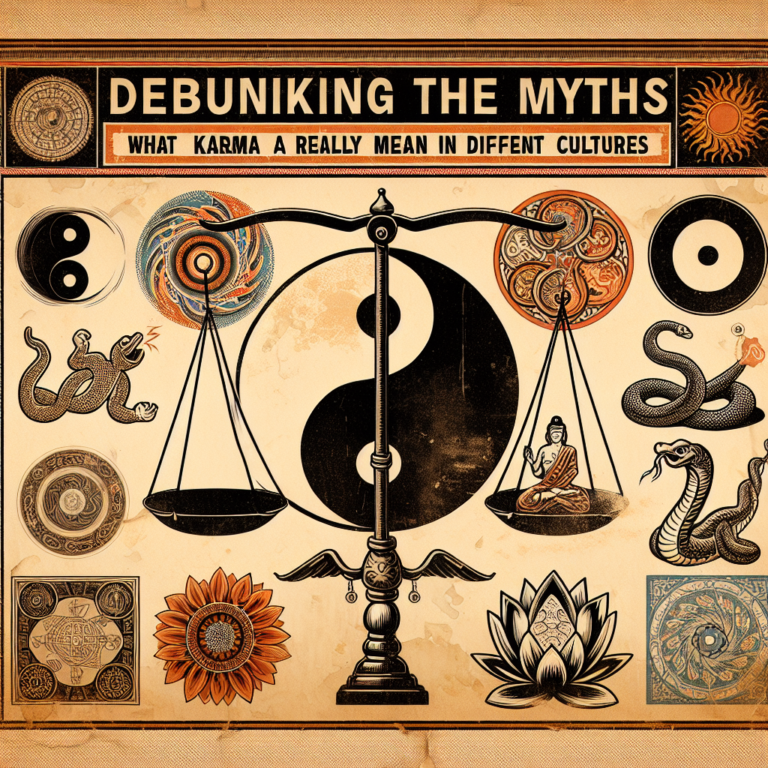Karma is a term frequently evoked in discussions about morality, ethics, and spirituality. Yet, the concept of karma is often misunderstood and misrepresented. Many people view it as a sort of cosmic scorekeeping system — doing good deeds earns you rewards, while bad actions lead to punishment. However, a deeper understanding reveals that karma is less about external retribution and more about an intricate law of cause and effect that governs our actions and their consequences, permeating our everyday lives.
The Fundamental Principle of Karma
The essence of karma lies in the principle of cause and effect. Every action, whether it’s a thought, word, or deed, creates a ripple effect in the universe. This means that our behaviors — both positive and negative — influence not just ourselves but also the world around us. In Buddhist and Hindu philosophies, karma is not a judgment passed upon us by an external deity; it is rather an inherent natural law. Thus, we are responsible for our actions and their subsequent outcomes.
The Three Types of Karma
Sancita Karma: This is the accumulated karma from past actions, both from this lifetime and previous existences. It encompasses all the potential actions that may come to fruition later on.
Prarabdha Karma: This is the portion of sancita karma that is currently being experienced. It represents the conditions of our current life, including challenges and circumstances we face.
- Kriyamana Karma: This type of karma refers to the actions we are performing right now that contribute to our future experiences. Every decision we make becomes part of this ongoing cycle.
The Role of Intent in Karma
One of the critical aspects of karma is the intention behind an action. In many philosophies, it is believed that the intent can significantly alter the nature of the karmic consequences. For example, helping someone selflessly out of compassion generates positive karma, while helping merely for recognition or gain could yield mixed results. This suggests that conscious awareness and mindfulness play crucial roles in shaping our karmic journey.
Everyday Examples of Karma
Understanding how karma operates in daily life can bring clarity and encourage more intentional living. Here are a few scenarios that illustrate how the law of cause and effect manifests in real-world situations:
Interpersonal Relationships: Consider a situation where you are kind and forgiving to a colleague who is struggling. This action might foster a positive relationship, often leading to reciprocal kindness. In contrast, if you lash out in anger, it can create a cycle of negativity and stress.
Environmental Impact: Our actions towards the environment can also serve as a form of karma. Choosing to reduce waste, recycle, or support sustainable practices can create a ripple effect, benefiting future generations and fostering a culture of environmental respect and responsibility.
- Health and Well-Being: Our choices about diet, exercise, and mental health have direct karmic implications. Eating nourishing foods and practicing mindfulness can enhance our well-being, while neglecting our health may lead to ailments and dissatisfaction.
The Misconceptions About Karma
While karma offers valuable insights into the interconnectedness of our actions and their effects, several misconceptions warrant clarification:
Karma is Punitive: Many believe that karma punishes wrongdoers, but true karma is more about the lessons we learn from our experiences. It offers opportunities for growth rather than punishment.
Karma is Immediate: Some think that karmic effects manifest immediately, but in reality, the consequences can unfold over time, often crossing lifetimes or existence spans.
- Karma is Deterministic: While our actions do shape our experience, we also have free will and the capacity to change our paths. Each moment is an opportunity to generate new karma through our choices.
Cultivating Positive Karma
To harness the potential of karma for personal transformation, consider adopting the following practices:
Mindfulness: Being aware of your thoughts, words, and actions helps to ensure they align with your values and intentions.
Acts of Kindness: Small acts of kindness can resonate far beyond their immediate context, contributing to a positive karmic cycle.
Self-Reflection: Regularly evaluating your actions can provide insights into how they affect your life and the lives of others.
- Forgiveness: Letting go of past grievances not only alleviates personal burdens but also creates space for healing and positive karma.
Conclusion
Karma is more than just a mystical concept; it is a profound understanding of the law of cause and effect that shapes the fabric of our everyday lives. It invites us to take responsibility for our actions, encouraging a deeper connection to ourselves and others while reminding us that we have the power to influence our future through our choices.
By recognizing and embracing karma, we can consciously craft a life filled with compassion, mindfulness, and positivity. In doing so, we contribute not just to our own learning and growth, but to the broader tapestry of existence shared by all.
FAQs
1. What is karma?
Karma is the law of cause and effect, where every action (good or bad) generates corresponding consequences in our lives and the lives of others.
2. How does karma affect our daily lives?
Karma influences our relationships, well-being, and experiences. Our actions and intentions shape our current conditions and future opportunities.
3. Can we change our karma?
Yes! We can change our karma by making more mindful and conscious choices. Each action contributes to our karmic legacy, and we always have the ability to generate new karma.
4. Is karma the same in all religions?
While the concept of karma is most often associated with Buddhism and Hinduism, many religions and philosophies acknowledge the principle of cause and effect in human actions, although they may interpret it differently.
5. Does karma work immediately?
Not necessarily. The effects of karma can unfold over time and may span across lifetimes. Immediate changes are not always visible, which emphasizes the importance of patience and consistent effort.
It seems like your message was cut off. Could you please provide more detail or specify what kind of prompt you’re looking for? Whether it’s for writing, brainstorming ideas, or something else, I’m here to help!, #Karma #Unveiled #Understanding #Law #Effect #Everyday #Life, #Karma #Unveiled #Understanding #Law #Effect #Everyday #Life, 1736630637, karma-unveiled-understanding-the-law-of-cause-and-effect-in-everyday-life





